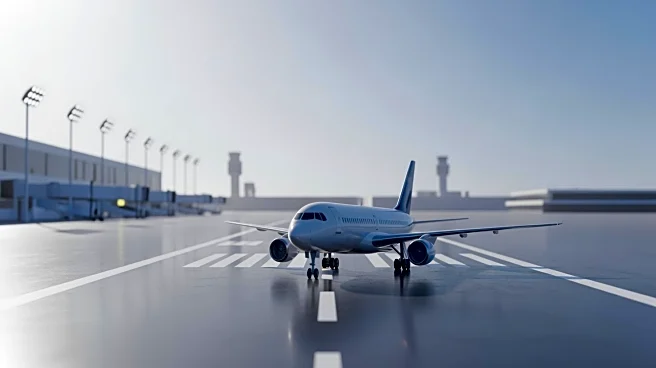What's Happening?
Delta Air Lines, along with other carriers, is reducing flights at major U.S. airports, including Hartsfield-Jackson Atlanta International Airport, following a federal mandate from the Federal Aviation Administration (FAA). This decision is a response
to the ongoing government shutdown, which has led to increased strain on air traffic controllers and pilots. The FAA has ordered a 4% reduction in operations at 40 of the busiest airports, with plans to increase this to 10% by the following Tuesday. Delta is allowing affected customers to reschedule their flights for free or cancel them altogether. The airline expects most flights to operate on time despite the reductions. The FAA's decision comes as federal workers, including air traffic controllers, have been working without pay for over five weeks.
Why It's Important?
The reduction in flights is significant as it highlights the broader impact of the government shutdown on the aviation industry and the economy. The FAA's mandate aims to ensure safety amid reports of stress among air traffic controllers. This situation affects not only airlines but also passengers who may face disruptions during a busy travel period. The shutdown has sparked political debate, with figures like Georgia Sen. Raphael Warnock advocating for legislation to pay federal workers during the shutdown. The White House has criticized the situation, suggesting it could affect holiday travel plans. The ongoing shutdown and its impact on air travel underscore the interconnectedness of government operations and the private sector.
What's Next?
As the flight reductions continue, airlines and passengers will need to adapt to the changes. The FAA will monitor the situation closely and may take further action if necessary to maintain safety. Political leaders may face increased pressure to resolve the shutdown, especially with the holiday season approaching. Airlines will continue to offer flexibility to passengers affected by the reductions, and further legislative efforts may be made to address the financial strain on federal workers.
Beyond the Headlines
The situation raises questions about the resilience of the aviation system and the potential long-term effects of prolonged government shutdowns on critical infrastructure. The stress on air traffic controllers and pilots could have implications for safety and efficiency in the industry. Additionally, the political blame game highlights the challenges of governance and the impact of political stalemates on everyday Americans.

















